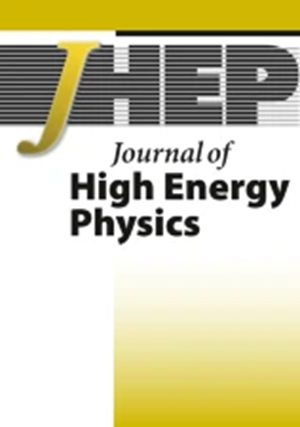Generalized free energy and dynamical state transition of the dyonic AdS black hole in the grand canonical ensemble
IF 5.5
1区 物理与天体物理
Q1 PHYSICS, PARTICLES & FIELDS
引用次数: 0
Abstract
A bstract We study the generalized free energy of the dyonic AdS black hole in an ensemble with varying electric charge q E and fixed magnetic charge q M . When we adjust the temperature T and the electric potential Φ E of the ensemble, the Ricci scalar curvature R and electromagnetic potential A u usually diverge at the horizon. We regularize them and incorporate the off-shell corrections into the Einstein-Hilbert action. Alternatively, we find that the off-shell corrections can also be obtained by adding a boundary near the horizon to exclude the singularities. Ultimately, we derive the generalized free energy which is consistent with the definition of the thermodynamic relations. Based on the generalized free energy landscape, we can describe the dynamics of state transition as a stochastic process quantified by the Langevin equation. The path integral framework can be formulated to derive the time-dependent trajectory of the order parameter and the time evolution of the transition probability. By comparing the probability with the result of the classical master equation, we attribute the contribution to the probability of one pseudomolecule or antipseudomolecule (the instanton and anti-instanton pairs) to the rate of state transition. These results are consistent with the qualitative analysis of the free energy landscape.大正则系综中动态AdS黑洞的广义自由能和动态态跃迁
研究了变电荷q E和固定磁荷q M系综中动态AdS黑洞的广义自由能。当我们调整温度T和系综电势Φ E时,里奇标量曲率R和电磁势A u通常在视界处发散。我们将它们正则化,并将离壳修正合并到爱因斯坦-希尔伯特作用中。另外,我们发现通过在视界附近添加边界来排除奇点也可以得到离壳修正。最后,导出了与热力学关系定义相一致的广义自由能。基于广义自由能格局,我们可以将状态转移动力学描述为一个由朗之万方程量化的随机过程。通过建立路径积分框架,推导出序参量随时间变化的轨迹和转移概率随时间变化的轨迹。通过将概率与经典主方程的结果进行比较,我们将一个伪分子或反伪分子(瞬子对和反瞬子对)的概率对态跃迁速率的贡献归因于此。这些结果与自由能景观的定性分析一致。
本文章由计算机程序翻译,如有差异,请以英文原文为准。
求助全文
约1分钟内获得全文
求助全文
来源期刊

Journal of High Energy Physics
PHYSICS, PARTICLES & FIELDS-
CiteScore
10.00
自引率
46.30%
发文量
2107
审稿时长
12 weeks
期刊介绍:
The aim of the Journal of High Energy Physics (JHEP) is to ensure fast and efficient online publication tools to the scientific community, while keeping that community in charge of every aspect of the peer-review and publication process in order to ensure the highest quality standards in the journal.
Consequently, the Advisory and Editorial Boards, composed of distinguished, active scientists in the field, jointly establish with the Scientific Director the journal''s scientific policy and ensure the scientific quality of accepted articles.
JHEP presently encompasses the following areas of theoretical and experimental physics:
Collider Physics
Underground and Large Array Physics
Quantum Field Theory
Gauge Field Theories
Symmetries
String and Brane Theory
General Relativity and Gravitation
Supersymmetry
Mathematical Methods of Physics
Mostly Solvable Models
Astroparticles
Statistical Field Theories
Mostly Weak Interactions
Mostly Strong Interactions
Quantum Field Theory (phenomenology)
Strings and Branes
Phenomenological Aspects of Supersymmetry
Mostly Strong Interactions (phenomenology).
 求助内容:
求助内容: 应助结果提醒方式:
应助结果提醒方式:


